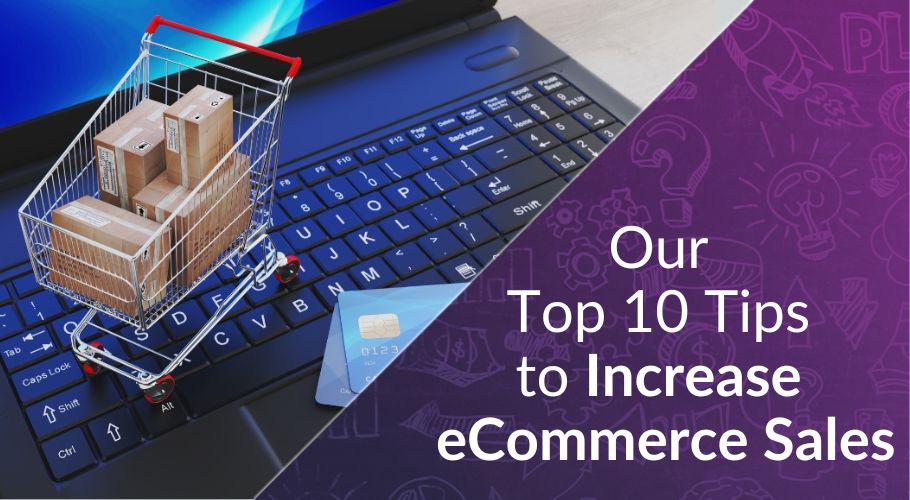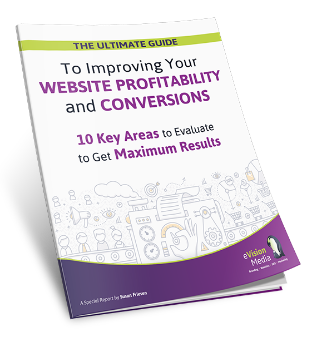Now that your online store is finally up and running, you’re probably excited beyond belief.
It may have taken months, if not years, to get to where you are today, and you’re likely anxious to start shipping orders to your customers.
But regardless of how exciting this can be, if you’re struggling to stay afloat, and you need to increase eCommerce sales just to keep your head above water, it can be incredibly devastating.
That being said, you can take comfort in the fact that eCommerce challenges are very common, not just for small businesses, but even for large corporations that are making hundreds of millions of dollars.
For example, a survey from Zoovu, which polled hundreds of executives from companies with a minimum of $200 million in eCommerce revenue, found that two-thirds of them “believe online commerce is broken” before citing a long list of issues.
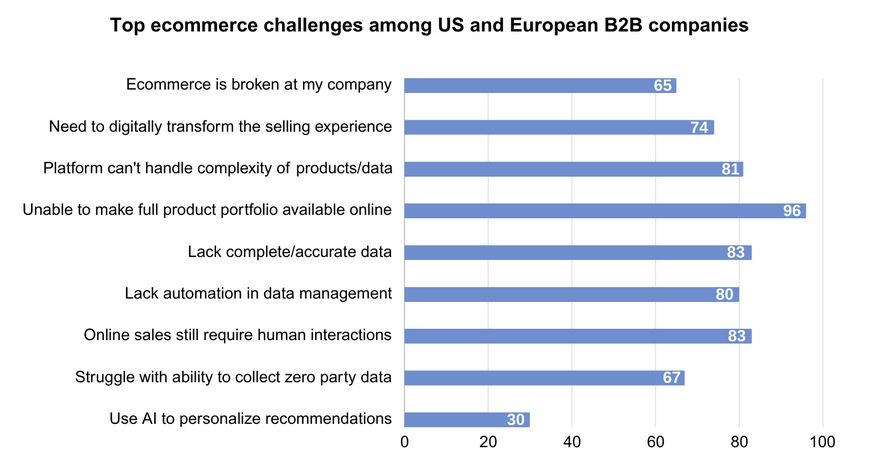
Unsurprisingly, the majority of executives polled said they’re dealing with nearly all of the eCommerce challenges listed above, including things like how to provide more personalized recommendations, how to adapt the selling experience digitally, and a range of data-related issues.
What’s more, they detailed several other problems, including things like frustrated customers, low conversion rates, and lost revenue.
As you can see, eCommerce challenges are quite common, regardless of how big your business is, and even large corporations are looking for ways to improve their online stores and increase eCommerce sales.
Luckily, there’s a lot you can do to improve your online store, and even a few simple changes can help to significantly improve eCommerce sales.
So, if you’re looking for eCommerce optimization tips and want to find out how to increase online sales, then keep reading to learn more.
Read: How Cross-Selling Boosts eCommerce Sales
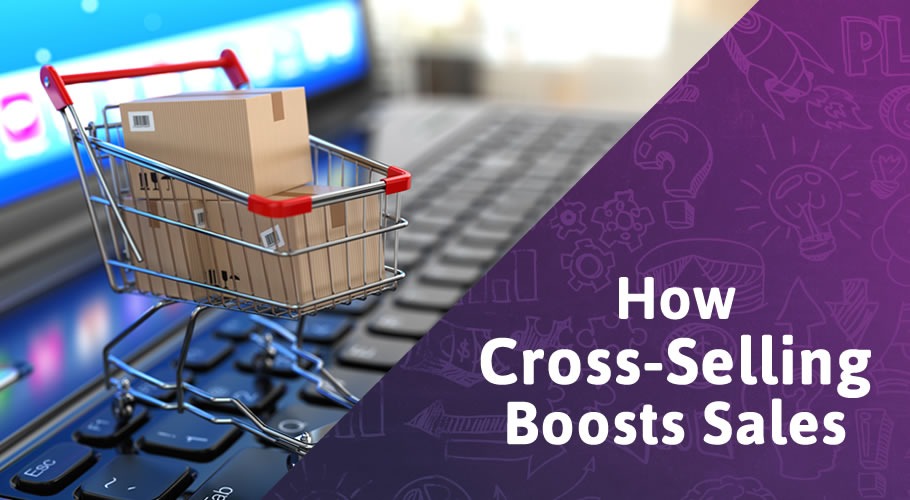
If you want to improve your online store and increase eCommerce sales, you need to make use of every strategy you possibly can.
Luckily, cross-selling offers yet another highly effective tactic that helps to improve the experience customers have when they visit your store, and in turn, boost online sales.
This article explains everything you need to know about cross-selling, including what it is, what to avoid when cross-selling, and how it can benefit your business.
How We Helped Our Client Improve Their Online Store
Recently, interior designer, realtor, and entrepreneur, Diane Lothian, came to us looking to update her online store, Riverhouse Boutique.
Initially, the store was integrated into her Riverhouse Designs website, which was built primarily to promote her interior design and home staging businesses.
But eventually, we decided that Riverhouse Boutique and Riverhouse Designs should have their own websites. Here’s what the online store looked like originally:
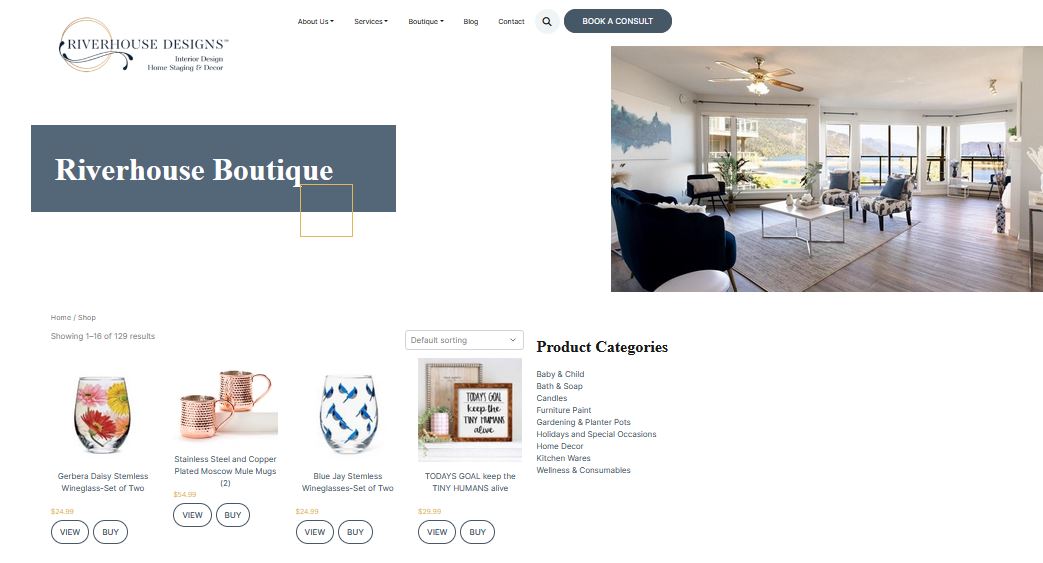
It looks fine, but from a brand positioning perspective, it was conflicting with her service offerings, and her unique selling proposition (USP) was nowhere in sight.
All of her products were there, and users could buy them, but nothing was compelling them to purchase anything.
The header image, for instance, is relevant to Diane’s interior design and home staging services, but not her boutique.
Having said that, here’s what the new Riverhouse Boutique header banner looks like:
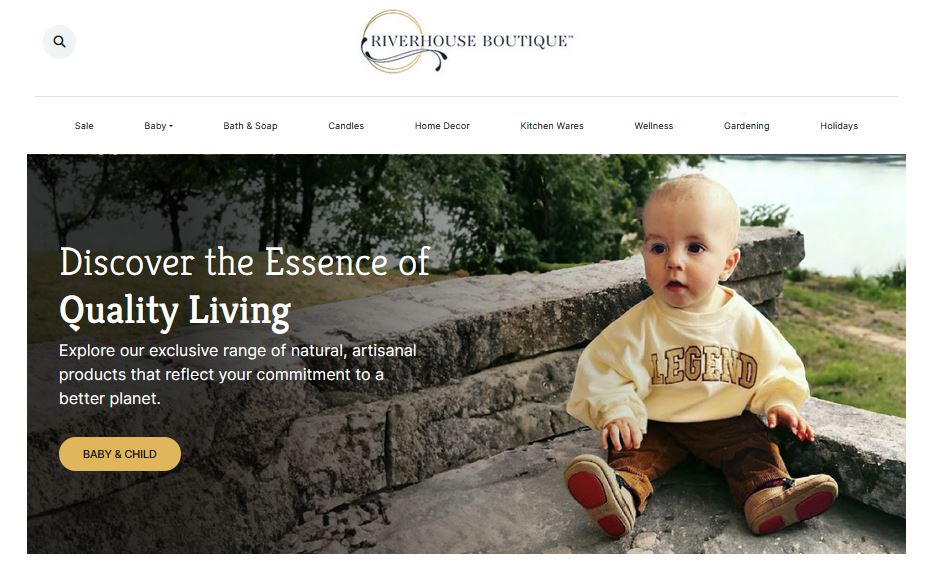
Right off the bat, the heading and subheading communicate Riverhouse Boutique’s values, and its USP, reminding the user that it carries exclusive, natural, quality, and artisanal products.
And as you scroll down the page, there are more mentions of the selling points of Diane’s products, along with sliders to show them off, and links to various product categories, all of which make things much more convenient and enticing for potential customers.
Having a separate website for the boutique also works much better, as all the focus is put on the products being sold, and users won’t have any confusion as to what the website is all about.
So, as you can see, improving your online store doesn’t have to be that complicated, and some high-quality images and compelling copy may be all you need to make a massive difference.
Our Top Tips to Help You Increase eCommerce Sales
As I already mentioned, if you want to increase eCommerce sales, there are some simple things you can do to improve your online store, like updating your copy and imagery.
But aside from those strategies, there is a litany of things you can do to improve your online store, including everything from swift and simple solutions to tedious and technical improvements.
And if you want to have a firm grasp of what’s going to be best for your eCommerce store, then it’s important to weigh your options and be aware of what’s possible.
With that in mind, below I’ve detailed several strategies to help you enhance your online store and boost eCommerce sales.
1) Understand Your Customers
If you don’t understand your customers, trying to encourage them to give you their hard-earned money will be nothing more than a crapshoot.
Below I’ve listed a couple of things you can do to start getting inside the heads of your ideal customers and marketing to them in a way that entices them to do business with you.
Create Personas: You should begin by creating detailed customer personas, as understanding your target audience’s needs, values, preferences, behaviours, and pain points will allow you to tailor your offerings and marketing messages more effectively.
Collect and Analyze Data: You can also use analytics tools to gather data on how users interact with your site. This will allow you to find patterns in their purchasing behaviour, page visits, and cart abandonment rates, which can help you identify areas for improvement.
2) Optimize Your Website
You can have the best products or services in the world, but if your website looks or functions like it was built by an amateur, then you’re likely to have a hard time selling anything.
Here are several strategies you can employ to ensure your website is offering customers the best possible experience:
Mobile Responsiveness: With an increasing number of consumers shopping on their smartphones, offering a great mobile experience is crucial. A big part of this is making sure your website is mobile-friendly, meaning its layout will seamlessly adapt to various screen sizes.
Fast Loading Times: Page speed can significantly affect customer satisfaction and your website rankings, but tools like Google Pagespeed Insights can help you identify and fix slow-loading pages.
High-Quality Product Images and Detailed Descriptions: If you want to entice customers, you’ve got to provide clear, high-resolution images and detailed product descriptions. These elements help customers make informed purchasing decisions and reduce the likelihood of returns.
Easy Navigation and Search: A user-friendly eCommerce website will be able to help customers find what they’re looking for quickly, and this involves things like having an intuitive navigation menu and a robust search function with filters.
Professional Brand Presence: Another eCommerce optimization strategy is to make sure your website includes a professional brand presence that effectively communicates your brand’s values and USP. This can help to enhance your online store and improve sales by providing consistent messaging, differentiating your brand from competitors, and building authority, loyalty, and trust with your audience.
3) Enhance the User Experience
At the end of the day, the quality of the experience you’re offering to users will likely be the deciding factor in whether or not your online store will see success.
With that in mind, here are a few things you can do to ensure your eCommerce website is providing a great experience for everyone who visits it:
Simplify the Checkout Process: A complicated checkout process is a common reason for cart abandonment, and when customers abandon their carts, they’re unlikely to come back. So, make sure to streamline the process, minimize the number of steps, and offer guest checkout options.
Personalization: You can also use customer data to personalize the shopping experience for each one of your customers, which can be done by displaying relevant product recommendations, content, and offers based on browsing and purchase history.
Customer Service: If you want to keep customers happy, you should offer multiple customer service channels, such as live chat, email, and phone support. You may also want to consider integrating a chatbot into your website for 24/7 assistance with common inquiries.
Shipping Costs: To prevent cart abandonment due to high shipping costs, there are many things you can do, like offering free shipping thresholds or flat-rate shipping fees, providing clear shipping policies upfront and cost calculators early in the checkout process, absorbing part of the shipping cost into the price of your products, providing multiple shipping options, and even retargeting customers who abandoned their carts to offer them shipping discounts or incentives.
4) Make Use of Marketing Strategies
If you don’t market your online store, then regardless of how great it is, customers will be unlikely to find it.
Here are several marketing strategies you can use to promote your online store and connect with your ideal customers:
Email Marketing: Email campaigns offer a tried-and-true way to engage with customers, as they allow you to send personalized offers, product recommendations, and newsletters, which helps to keep your brand top of mind.
Social Media Marketing: Leveraging social media platforms can allow you to build brand awareness, engage with customers, and drive traffic to your site, and you can also use social media advertising to reach a broader audience.
Content Marketing: Creating valuable content related to your products or industry can help to build trust with your audience and drum up interest in your offerings. Things like blogs, how-to guides, and videos can attract visitors to your site and establish your brand as an authority.
Search Engine Optimization (SEO): Optimizing your website for search engines can significantly improve its visibility, making it more likely that potential customers will find it. You can do this by using relevant keywords, optimizing meta tags, and earning quality backlinks, among other things.
Paid Advertising: Through the use of things like audience segmentation and keyword targeting, paid advertising can help you improve your online store and increase eCommerce sales by promoting it to those who are actively seeking the kinds of products and/or services you offer. This helps to drive qualified traffic to your store, increase awareness of your brand, and make you more visible to your target market.
5) Leverage Technology and Tools
Like them or not, artificial intelligence (AI) and other tools can be a big help when you’re trying to boost eCommerce sales.
Here are some ways you can use AI and other tools to enhance your online store:
Use of AI and Machine Learning: Implementing AI technologies can allow for better product recommendations, inventory management, and customer service, through the use of chatbots.
Augmented Reality (AR): AR is another tool to consider, as it can enhance the online shopping experience by allowing customers to visualize products in their environment, such as furniture, before making a purchase.
Payment Options: If you want to convince potential customers to give you their business, it’s important to offer multiple payment options, including credit cards, PayPal, and even newer payment technologies like Apple Pay or cryptocurrency.
6) Encourage Customer Feedback and Loyalty
Reading reviews is something that most online consumers do, as it helps them gauge the quality of your products and services.
That being said, you should encourage customers to leave reviews and share their experiences, as positive reviews can help boost your credibility and attract new customers.
Believe it or not, even negative reviews can give you the opportunity to build trust, depending on how you choose to respond to them.
At the same time, anything you can do to improve customer loyalty is going to be good for your online store, so you might want to think about creating a loyalty program that rewards repeat customers by offering discounts, early access to new products, or exclusive deals.
7) Analyze Your Competitors
Paying attention to what the competition is doing provides invaluable insights into how you can enhance your online store and entice customers to do business with you, rather than competitors.
So, you should make a point of regularly analyzing your competitors’ websites and marketing strategies to learn from their successes and mistakes and identify opportunities to differentiate your brand.
8) Monitor Performance and Adjust Strategies
As you make changes to your online store, monitoring its performance will be key if you want to figure out what’s working and what isn’t.
With that in mind, you should regularly monitor key performance indicators (KPIs) such as conversion rates, average order value, and customer acquisition costs, and then use this data to adjust your strategies and improve performance.
9) Expansion Considerations
If you’re planning to expand, whether that’s globally, nationally, or into specific countries or regions, you may need to think about localizing your website by offering multiple languages, currencies, and payment options that cater to different markets.
For instance, if you’re okay with just selling in B.C., then this may not be necessary, but if you want your offerings to be available across all of Canada, then your website should have, at the very least, both French and English options.
10) Compliance and Security
You might think people aren’t paying attention to this sort of thing, but nothing could be further from the truth.
People will look into the level of security your online store offers, and any data breaches or other funny business can permanently ruin your store’s reputation.
So, make sure to stay compliant with any relevant laws and regulations related to eCommerce, such as those that pertain to data protection and consumer rights.
You should also implement strong security measures to protect customer data, such as SSL certificates and secure payment gateways, and regularly update your website’s security protocols.
Do you need some help optimizing your online store? Why not set up a free 30-minute consultation with me to find out how we can help?
To your business success,
Susan Friesen
P.S. If you liked the article, you might want to subscribe to our newsletter. We publish tons of valuable content to help you learn more about marketing, and subscribing is the best way to ensure you don’t miss out. Additionally, if you’d like to learn more about building a search engine optimized website, click here for our free website guide.
